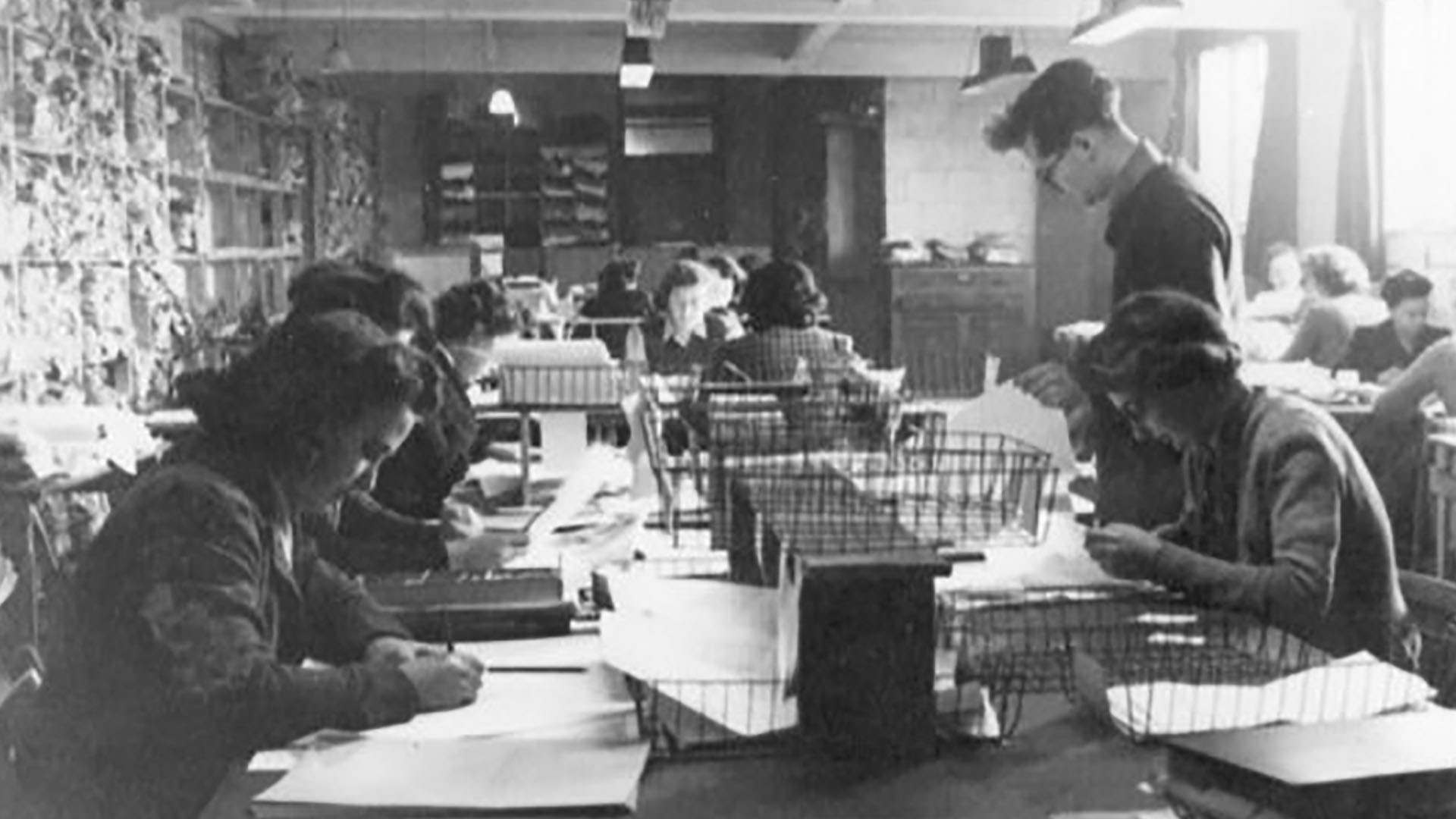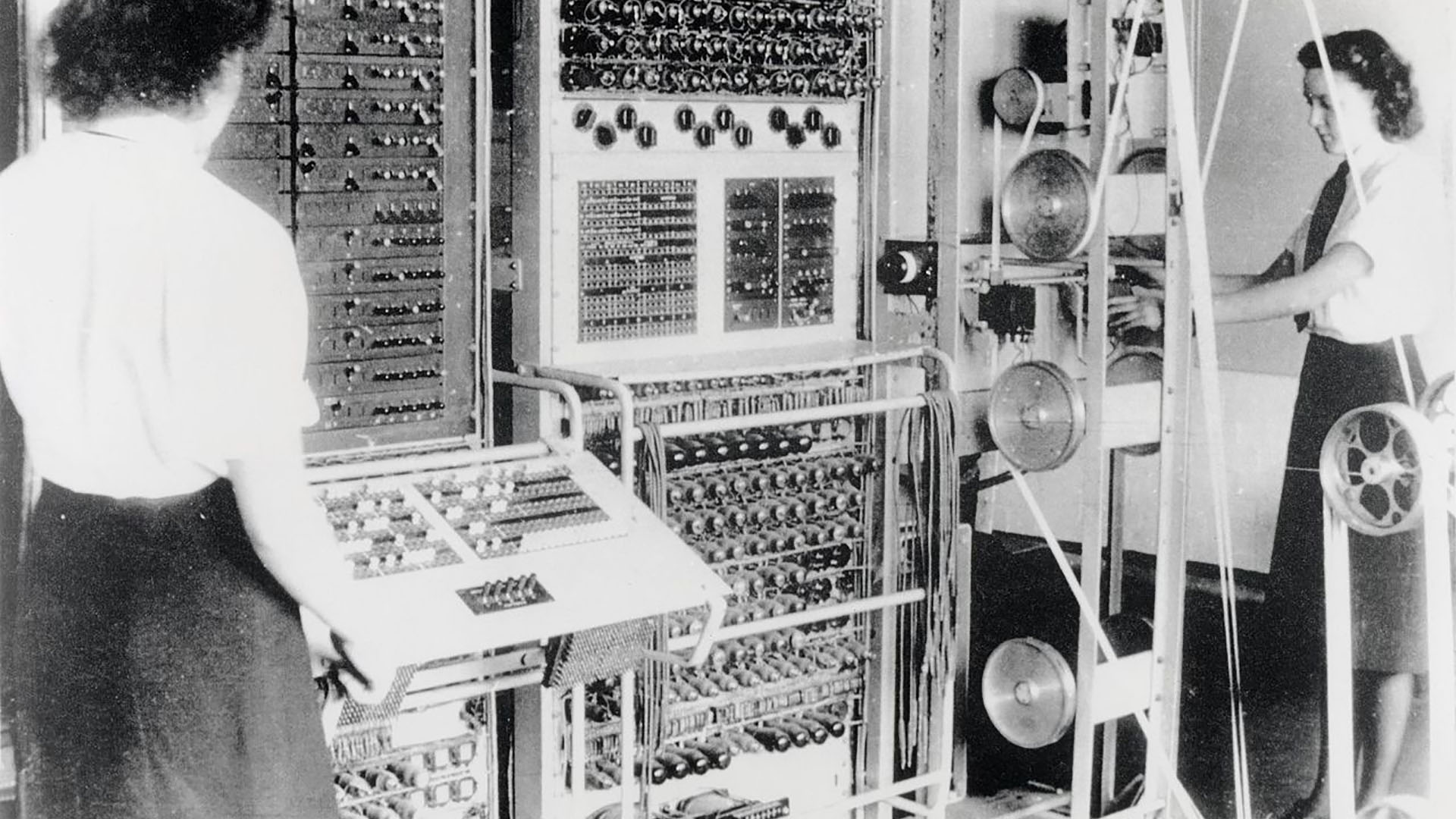Kathleen Cuthbert came from rural Ulster and went on to work in some of the highest-level and top-secret work in the Second World War. During her lifetime, she never spoke of her work in the Second World War.
Born on either 4th or 5th October 1920, she was the daughter of farmer James Milliken Ferguson and Sara Ferguson (née Foster). She grew up in Ballyvoy near Doagh, Co. Antrim along with two brothers and two sisters.
She attended Londonderry High School For Girls and was Head Girl during her time there. She had lived in Co. Londonderry from the age of 5 years old with her maternal grandparents. While at school, she was editor of the school magazine, a prefect, a house captain, and Head Girl. A keen hockey player, she played as a goalkeeper in the school’s 2nd XI winning 5 out of 7 games in the 1937-1938 Derry and Antrim School Girls’ League.
She received a double scholarship of £40 per year and graduated from Queen’s University with a degree in French and German Literature. While at Queen’s University, she lived at Riddle Hall, a residence for female students. She graduated in 1942, having won several national and international prizes.
Kathleen was one of the most outstanding students in Northern Ireland at the time. After university, Bletchley Park recruited Kathleen as part of the Enigma code cracking team. Headhunted to be a translator due to her linguistic knowledge and academic prowess, her job under Alan Turing remained top secret.
The work at Bletchley Park was invaluable to the Allied war effort as they cracked the “unbreakbale” German High Command Enigma Code. Kathleen Cuthbert was one of those who helped develop the Colossus code-breaking machine, which is said to be the forerunner of the modern computer.
She married Norman Cuthbert on New Year’s Day 1st January 1943. The couple met in Portstewart, Co. Londonderry where Norman was a teacher. Kathleen lived in the seaside town with her mother after her parents divorced. They had their first daughter, Christine, in 1946. Kathleen was fortunate to have a grandmother, mother, aunt, and husband to help look after the girl.
Kathleen took part in a language exchange in Bernaville, France to enhance her language skills after the war. There, she stayed with the
Blaire family working as an English tutor. Kathleen and the family became lifelong friends. In 1945, she received a Master’s degree from Queen’s University, Belfast. Parts of her thesis on maritime vocabulary in an obscure German poem were possibly written during her time at Bletchley Park. She also found time to undertake a course in Japanese during the war.
Life after the War
Norman went on to lecture in Economics at Queen’s University, Belfast. Kathleen later joined the QUB staff as a tutor in the French department. The couple took up residence on the nearby Lisburn Road, Belfast. They were involved in many activities including a short membership of a Beagle hunt.
The couple enjoyed sailing on Strangford Lough, and Kathleen read to friends who had lost their sight. Among these were Professor Alan Milne, who was a paratrooper blinded at Arnhem. In a packed social life, she also found time to be a member of the University Wives’ Club, Derry High School Old Girls, and worked with the Citizen’s Advice Bureau. Both Kathleen and Norman were keen travellers and she always explored the local languages.
One of her unsung talents was that of a seamstress. Belfast milliner John Green often made hats of dyed fine straw or felt to accompany her outfits. She was also an accomplished cook, often preparing meals for large groups of people. Under a male pseudonym, she wrote a recipe column in the Belfast Telegraph during the 1960s.
In 1975, Norman retired from Queen’s University and took up an appointment at the University of the West Indies, Barbados. The couple remained on the island for a year before returning to Belfast. They enjoyed further visits to the Far East, Australia, Africa, Russia, East Germany, and Europe. Her family guess she had visited over 40 countries.
Kathleen’s later years had their share of excitement too. At the age of 60, she took part as a navigator in the Monte Carlo Dash, a women’s only rally, racing to get to Monaco by the shortest route possible.
Norman passed away in 1991 and it was something Kathleen never got over. In her later years, she became an Advanced Motorist and learned how to use a modern computer with great success. She would browse the internet and kept in touch with friends across the world by email. Another favourite pastime was to watch her favourite singers on YouTube.
Having traveled the world, Kathleen Cuthbert’s favourite place was her cottage at Rosbeg, Co. Donegal. She and Norman built it in 1966 with proceeds from their tutoring work at Queen’s. She visited the cottage every year until it became too much in latter years.
In 2010, she moved to Bristol to be close to immediate family. While there, the family grew to include four great-grandchildren. On her 96th birthday, she blew out the candles on her cake and enquired when she could return to her beloved Rosbeg.
In May 2016, Prime Minister David Cameron awarded Kathleen a certificate in recognition of her wartime work but during her lifetime, she never spoke of her time at Bletchley Park.
Kathleen Cuthbert passed away at Abbeyfield House, Henleaze, Bristol on 1st November 2016 aged 96 years old. Her funeral took place on 18th November 2016 at Canford Crematorium, Westbury-on-Trym, Bristol. Right Reverend George Cassidy, recently retired Bishop of Southwell conducted the ceremony.

